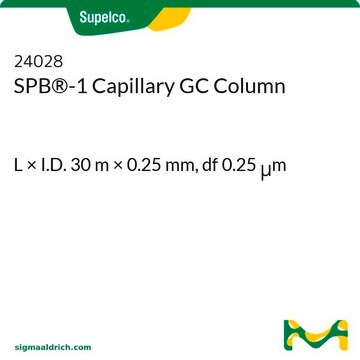24029
SPB®-1 Capillary GC Column
L × I.D. 30 m × 0.25 mm, df 1.00 μm
Sign Into View Organizational & Contract Pricing
All Photos(1)
About This Item
UNSPSC Code:
41115710
eCl@ss:
32119290
Recommended Products
material
fused silica
Agency
meets requirements for USP G1, G2, and G9
parameter
-60-320 °C temperature (isothermal or programmed)
Beta value
63
df
1.00 μm
technique(s)
gas chromatography (GC): suitable
L × I.D.
30 m × 0.25 mm
matrix active group
Bonded; poly(dimethyl siloxane) phase
column type
capillary non-polar
Looking for similar products? Visit Product Comparison Guide
General description
Application: This column is often used for traditional general purpose applications, where a non-polar column is required. Analytes will be separated primarily according to boiling point.
USP Code: This column meets USP G1, G2, and G9 requirements.
Phase:
USP Code: This column meets USP G1, G2, and G9 requirements.
Phase:
- Bonded
- Poly(dimethyl siloxane)
- ≤0.32 mm I.D., <2 μm: -60 °C to 320 °C (isothermal or programmed)
- ≤0.32 mm I.D., ≥2 μm: -60 °C to 300 °C (isothermal or programmed)
- ≥0.53 mm I.D., <2 μm: -60 °C to 300 °C (isothermal) or 320 °C (programmed)
- ≥0.53 mm I.D., ≥2 μm: -60 °C to 260 °C (isothermal) or 280 °C (programmed)
Application
SPB®-1 Capillary GC Column was used for speciation of the nitrogen compounds (quantitatively), which are polar and somewhat basic in nature, with chemiluminescence detection.
Other Notes
We offer a variety of chromatography accessories including analytical syringes
Legal Information
SPB is a registered trademark of Merck KGaA, Darmstadt, Germany
Storage Class Code
11 - Combustible Solids
WGK
WGK 1
Flash Point(F)
214.0 °F - closed cup
Flash Point(C)
101.1 °C - closed cup
Choose from one of the most recent versions:
Already Own This Product?
Find documentation for the products that you have recently purchased in the Document Library.
Siyi Wang et al.
Colloids and surfaces. B, Biointerfaces, 107, 251-256 (2013-03-26)
By combining turbidimetric titration, dynamic light scattering (DLS), and zeta potential methods, we demonstrated that the adsorption of bovine serum albumin (BSA) in annealed cationic spherical polyelectrolyte brushes (SPB) can be controlled by modulating the pH, ionic strength, BSA concentration
David Schleheck et al.
Applied and environmental microbiology, 70(7), 4053-4063 (2004-07-09)
Parvibaculum lavamentivorans DS-1(T) utilized the commercial surfactant linear alkylbenzenesulfonate (LAS) (20 congeners with C(10) to C(13) side chains) as a carbon and energy source by shortening the side chain, and sulfophenylcarboxylates (SPCs) and similar compounds (e.g., alpha,beta-unsaturated SPCs [SPC-2Hs]) were
Hiromi Kitano et al.
Journal of colloid and interface science, 282(2), 340-348 (2004-12-14)
Telomers of N,N-dimethyl-N-(3-sulfopropyl)-3'-methacryloylaminopropanaminium inner salt (SPB), 2-methacryloyloxyethyl phosphorylcholine (MPC), and N,N-dimethyl-N-(1-carboxymethyl)-2'-methacryloyloxylethanaminium inner salt (CMB) were prepared by UV irradiation in the presence of N,N,N',N'-tetraethylthiuram disulfide and a disulfide-group-carrying iniferter (a compound which pursues initiation, chain transfer, and termination), Cys-BDC, which
Pooja Mittal et al.
Journal of ultrasound in medicine : official journal of the American Institute of Ultrasound in Medicine, 26(3), 347-353 (2007-02-28)
Evaluation of fetal cerebral cortex sulcation is important for the pre-natal diagnosis of neuronal migration disorders. Although abnormal sylvian fissure morphologic features are frequently observed in these conditions, the diagnosis of an abnormal sylvian fissure relies on subjective interpretation of
Arunachalam Paraneeiswaran et al.
Journal of hazardous materials, 283, 582-590 (2014-12-03)
Naturally stressed habitats are known to be repositories for novel microorganisms with potential bioremediation applications. In this study, we isolated a [Co(III)-EDTA](-) reducing bacterium Bacillus licheniformis SPB-2 from a solar salt pan that is exposed to constant cycles of hydration
Our team of scientists has experience in all areas of research including Life Science, Material Science, Chemical Synthesis, Chromatography, Analytical and many others.
Contact Technical Service



